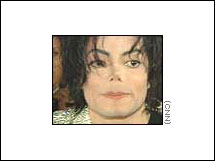 |
| Michael Jackson may lose his stake in the lucrative Beatles song catalog, as well as other assets. |
|
|
|
|
|
NEW YORK (CNN/Money) -
Guilty or not guilty, Michael Jackson appears to be sinking deeper and deeper into a financial hole that may cost him his lucrative stake in the Beatles music catalog as well as the rights to his own platinum-selling songs.
At Jackson's child-molestation trial in Central California, now in the hands of a jury, government witnesses testified that the legendary pop star is facing a severe cash crunch. Likely his most valuable asset: the Beatles song rights he bought in the 1980s for about $48 million, now estimated to be worth $400 million or more.
Bank of America, the nation's No. 2 bank, provided further evidence of a financial crisis when it recently sold two Jackson loans valued at $270 million to a private hedge fund, according to people familiar with the transaction.
To secure the Bank of America loans, Jackson offered as collateral his 50 percent stake in a Sony partnership that holds copyrights to more than 200 Beatles songs. The loans were also backed by Jackson's own music library and a partial deed on his Neverland Ranch near Santa Barbara, Calif.
Technically Jackson has defaulted on loan payments, one of the sources said.
Typically, when a debtor defaults or is about to default on a loan, terms are renegotiated. Another option is for the lender to sell the loan -- and the collateral that comes with it -- to another party. Bank of America chose to sell the loans to the hedge fund, New York-based Fortress Investment Group.
Depending on negotiations with Fortress, the risk that Jackson could lose the copyrights to the Beatles songs as well as his own hit recordings is real.
An accountant testifying at Jackson's child molestation trial in early May told jurors that the rock star is in financial straits. Forensic accountant John Duross O'Bryan said Jackson is spending about $20 million to $30 million a year more than he earns.
Jackson, Duross O'Bryan testified, has long-term liabilities of about $415 million. The result is "an ongoing cash crisis," Duross O'Bryan testified.
To fund his lavish lifestyle, Jackson has borrowed against his assets. Duross O'Bryan said that one of the loans that Bank of America sold to Fortress, valued at $200 million, is due to be paid in full in December 2005.
Bank of America declined comment.
Peter Briger, a principal at Fortress, did not return a call seeking comment. The company, according to its Web site, manages $15 billion in assets, a third of which is invested in distressed debts.
A $47.5 million bet pays off
Losing the Beatles rights could put into play one of the world's most valuable song portfolios.
Jackson, 46, acquired the Beatles song catalog in 1985 for $47.5 million, outbidding ex-Beatle Paul McCartney. Jackson then sold a piece of his stake to Sony (Research) a decade later, creating a joint venture called Sony/ATV Music Publishing. The venture is now believed to be worth more than $400 million.
Song catalogs have become hugely lucrative in the last two decades due to the compact disc boom, rising sales of Internet downloads, and movie studios and advertisers willing to pay royalties to use hit songs in film scores and commercials.
Jackson, through Sony/ATV, owns all but a small selection of the Fab Four's compositions, including megahits like "Yesterday," "Let It Be," and "Sgt. Pepper's Lonely Hearts Club Band." He does not, however, own the actual sound recordings; those rights are held by EMI's Capitol Records.
Royalty arrangements can be quite complicated. Basically, Jackson and Sony receive a fee each time one of the Beatles songs is played on the radio or a Beatles album is sold. Industry royalty rates for single-song plays can run under 10 cents, while rights holders typically earn a small percentage on each album sold.
It's hardly chump change: the small amounts add up to millions of dollars in revenues a year.
Another major revenue stream for Jackson is Mijac Music, the copyright holder on all of his hits and other artists' songs. Mijac is thought to be worth roughly $75 million, according to reports.
Despite Jackson's shaky finances, the long-term value of his $475 million worth of song libraries drew Fortress Investment's interest, speculated James Dunn, a vice president at InvestorForce, a Wayne, Penn.-based investment adviser to institutional investors.
"That's clearly the trade they're making" in placing a bet on Jackson's debts.
Hedge funds are increasingly popular, largely unregulated investment vehicles that are designed for wealthy investors looking for big returns on riskier bets. According to InvestorForce, there are more than 4,000 such funds with more than $800 billion in assets. HedgeWeek, an industry trade publication, reported last month that U.S. hedge fund assets recently $1 trillion in the first quarter of 2005.
A small fraction of hedge funds invest in what are known as distressed securities, such as debts like Jackson's.
Jackson was indicted last year on charges he molested a boy, then 13, providing him with alcohol, and then conspiring to hold him and his family hostage after a damaging TV documentary about Jackson and the boy aired.
Jackson has denied the charges against him. (For the latest on the trial, click here).
To find out who else is making business headlines today, click here.

|